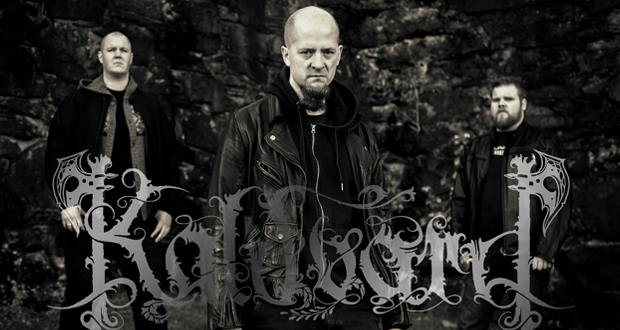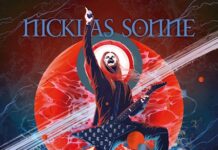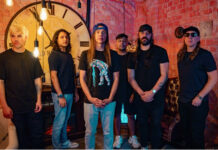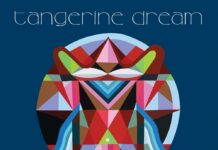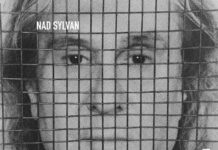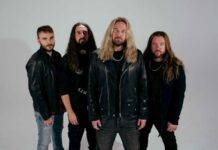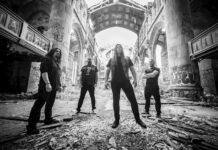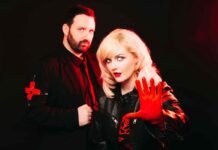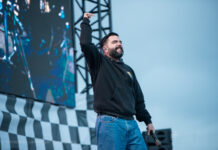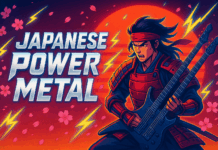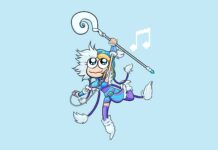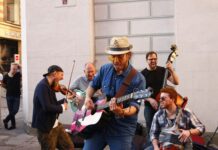I recently had the pleasure of immersing myself in the upcoming record entitled Dømt til Bål og Brann by the Norwegian entity known as Kaldvard, and it literally blew me away by means of its epic melodies, crushing riffs, and evocative atmosphere. Now, their debut offering (Fossegrimens Pant, 2018) was a solid slab of melodic pagan metal with bombast aplenty to it, but this new output of theirs is a majestic piece of work that inhabits all the best traits and characteristics of the aforementioned genre, and if you are looking for a moody album to accompany you on your long walks through the fields or forests this winter, look no further than this one. Read on, folks.
Greetings, thanks for taking the time out of your busy schedule to talk to RAMzine – much appreciated. For those out there who are not familiar with the music and history of Kaldvard, could you outline the story so far and touch a bit on your two epic-sounding releases and line-up etc.?
K: Greetings! No problem. We like talking to you. Kaldvard is a Norwegian black metal band from Bergen, Norway. We actually call our music melodious black metal. The band was formed in late 2017 by Kaldr (guitars). It all started when he sent a riff he had recorded to Galge (vocals). They have worked together before and Kaldr knew that Galge was the ex-vocalist for the black metal band Gravdal. So, instead of him telling Kaldr if the riff was good or bad, he simply asked if he could do the vocals for it when the song was ready. We made two songs together to see if we liked working together. Quickly after that we began the work on an album. Being new to everything that has to do with music production etc., it took some time. But we eventually got help from friends and a guy named Egill who mixed the album. We released Fossegrimens Pant in late 2018. But the inspiration of actually having the drive to do something like this exploded at one point and so Kaldr began making new riffs – he was full of ideas and motivation for a second album. For this record, which is going to be released in November, we got ourselves a new bass player. On the first album, Kaldr recorded the bass parts as well, but he wanted a guy who actually has bass as his main instrument so that the bass track feels more alive and vibrant. He asked Ve if he could try to enliven things, and as it turns out, he could. The first song he recorded was the title track ‘Dømt Til Bål Og Brann‘, and he did really well. Therefore, he is now the bass player. Kaldr does all the guitars and everything that has to do with recording and the work that follows before he then sends it on to others for the mixing and mastering and whatnot. What is new and different on this album is that Kaldr has mixed and mastered ‘Innferd‘ by himself as a personal gesture for the album. On ‘Innferd‘, Kaldr has handled the vocals, guitars, bass, goat horn, synthesizer, etc. himself.

Tell us a bit about the early days of your work in music as well as how and why you started out playing extreme metal, and how you got into metal music in the first place.
K: The early days were dominated by a lot of trying and failing. Kaldr began playing the guitar again after years of not doing so. New software and programs, help from friends, no drummer, midi-maps, and so on and so forth… .it was all a bit overwhelming in the beginning. However, Kaldr has invested hours aplenty in this, so bit by bit he understood how to do things. Galge was a bit rusty as well as he had been out of Gravdal for a few years already, and now he was suddenly writing lyrics again. But we soon figured it all out and agreed on how we should work on this together. The most natural thing for Kaldr was to start out with metal. That is what he dabbed in when he was 15-16 years old and that was what he was listening to, so no other genre was considered at all. It was all about the heavy riffs and the high gain!
As you know, I was fond of your first output, Fossegrimens Pant, and there was potential aplenty to be found on that one, but your brand new offering entitled Dømt til Bål og Brann simply blows that one out of the water. The jump in quality all around is staggering and I find it utterly inspiring. It’s big, tense, and impassioned, but not pompous. What’s the atmosphere and vibe within the Kaldvard camp like right now given that you have this marvelous release to promote? I take it that you are satisfied with the result yourselves? Would you agree that it is also a marked improvement on its predecessor, the aforementioned Fossegrimens Pant?
K: First of all; thank you for both liking and writing about the first release! Hehe, the atmosphere in Kaldvard right now is… Well, we are excited and humble. We can’t wait for it to be released and we are extremely proud of it! We have made an album that is perhaps a bit out of line due to the use of fiddle and the spoken words and whispers as well as the clean guitars etc.., but we have tried to establish and set a mood for each song. The album as a whole has a lot of depth and substance to it, and we are looking forward to seeing if people will like it or not. We feel that we have something special here and we all agree that this album is better than the last one. We have invested in new things like guitar, bass, plugins, programs (daw) among other things, and we are all learning and finding out new stuff all the time. Egill (the aforementioned mixing dude) also joins in with respect to the “new stuff” and has invested in it as well, and so this is basically the result of a year where dedicated, hardworking souls, who have the same goals and interests invested in their own musical creation.
Could you elaborate a little on the importance of its lyrics and what they mean to you on a personal level?
K: When we started realizing that the birth of Kaldvard would lead us from mere musical experiments to actually forming a band, we quickly agreed upon two things: 1) we had to establish a lyrical theme, and 2) it should not be texts that the band could not back up or stand behind. So, we went through a thought process revolving around religion, politics, humanity, tales, myths, history, and nature. We settled on myths, tales, and history. You can very well find our lyrics to be about a troll or a form of ghost-like creature, but that is not because it is easier to make our own stories up about these things or because they don’t carry any controversy. We write about it because these things went on to create myths and legends that people not only used for entertainment, but they also sometimes believed in them and in many ways adapted themselves to them. Lyrically, we often try to depict situations where these things sort of became the reasons for the fear and hardship a human being could experience back then. The title track ‘Dømt Til Bål Og Brann‘ is a clear example of myths becoming “very real”. The fate of Anne Pedersdotter who was burned alive at the stake was not something new back then. It happened in Denmark and Norway (and in many other countries around the world). The sickest part of it all is that it still goes on today. We only have to look to places where education and knowledge are zero and where being an outcast or having a special talent or look can lead you to a very painful death. As we look forward into the future, one of the most dangerous things we can do is to forget the past. Therefore, the band decided that we wanted to place Anne Pedersdotter center stage and try to once more tell her story, or rather; our interpretation of her story. On a personal level this has something to do with respect for the victims of false accusations such as these historical figures and a need to take part in the storytelling of such great injustice.
As to the album title, it refers to Anne Pedersdotter, a supposed witch who was burned at the stake here in Bergen, Norway back in the year 1590. What attracted you to this story? It is rather well-known and legendary in Bergen, am I correct?
Galge: I grew up close to where she was executed. Today you see a narrow street there laid with cobblestones and houses wall to wall. As I grew older, I learned about what this place was used for in medieval times, and the story about Anne sort of stayed with me; it was such a strange feeling knowing what happened here.
K: The “Witch stone” placed on Nordnes in Bergen is a memorial for those who suffered the same fate as Pedersdotter, and the memorial also played its part in making me curious about these events. It is a well known story, yes. The story has been told through texts, theater, and movies. It probably became one of the inspirations for Galge’s pseudonym as “galge” translates to gallows, and the place where Anne was executed is named Galgebakken, which roughly translates to something like “Galllows Hill”.
The other tunes also thematize and revolve around mythological and historical subjects, wars, pride, honor, fate, and triumph. Tell me a bit about the lyrical aspects of Kaldvard in general. Is there a specific message or a theme of sorts to be found in your songs? Is there perhaps a philosophy or an ideology present in the music as well?
K: Well, early on we had a long talk about what our songs should be all about. This was before the lyrics for Fossegrimens Pant came into being. Kaldr was seeking a “meaning” or “something else”. He managed to explain it properly to Galge, and Galge then came up with 3 or 4 choices. We both agreed rather quickly on these myths, old stories, tales etc. It is fascinating to read about these things. Kaldr remembers when Galge called him with another idea for a text; “Well, did you know that an old lady named Schluggstein Matja took babies and drowned them, or put them inside of her?” (This is one of the songs on the first album and it is based on the myth of this lady who killed unwanted babies in the lake named Svartediket, which is now Bergen’s drinking water supply). So again, the theme is all about the myths as well as dark stories and tales. We want to tell that story and it fits so well with the style of music that we play! For an example, when you listen to the song entitled ‘Lyderhorn‘, you can hear the witches up on that mountain at the end of the song. Or with the burning of Anne, you feel that you are standing right there, watching her burn. We hope that new listeners will get and absorb the “feels and vibes” that we did when we composed and recorded the pieces and that they hear the things that we are trying to put across.
I love the fact that your lyrics are primarily in your native language (except for ‘The Executioner’s Diary’ and ‘Shield Wall’, that is). It adds a sense of authenticity and depth to the compositions, which probably has to do with the fact that your songs tend to focus on Norwegian myths and legends and whatnot. Was it a conscious decision to sing in your native language? Did it come about naturally?
K: It was very conscious! It is actually quite funny, because when Kaldr made the first song ‘Blåfrosset i Tid‘ he was always thinking of this old Norwegian dialect (a “countryside” dialect you could say), but he had forgotten that Galge does not talk this way. He is from the city and adheres to the “Bergen” dialect, so he sings it in his own dialect and that became a natural thing to do when both agreed that we should write in Norwegian. The two songs in English are us trying to do something “new”. Kaldr discovered that Galge has a good English pronunciation and we therefore began looking at the opportunity to incorporate some English into our song material, but not too much.
Having V’Gandr appear on the track ‘Tilbake’ was a stroke of genius in my opinion. His characteristic vocals are always easy to identity and they lend themselves really well to the song. Did you simply ask him to contribute vocals and then that was it, or is there a story of a specific reason why he ended up on the album? Are you fans of Helheim?
K: At an early stage in our planning of the album we decided that we should have a guest on vocals, but exactly who and on what song was not decided before Kaldr made ‘Tilbake‘. We wanted half the song with clean vocals and the other half with grim ones. The question was who and whether or not we were to “reach for the stars” or instead try to get in touch with some local underground bands like we are. Kaldr took a shot in the dark and just sent V’Gandr an email, asking if he would be interested in doing half a song with a band he had never heard of. He then listened to the song and said yes right away. The reason that we asked him is first and foremost because Kaldr is a huge Helheim fan and he knew that V’Gandr’s voice would fit the song perfectly. We paid for the studio hours and received four separate vocal tracks. We could NOT be more happy! When Kaldr glued the tracks together in the song he actually applauded. When thinking about this now, we feel very lucky to have done this, and maybe we should do one more songs like this…?
Are there any bands in particular that inspire you when it comes to writing music of your own?
K: There is not a specific band that inspires us when it comes to writing music. The thing that keeps us inspired is actually the hunger for doing things better and better. Doing it right and not fall for an easy way out or to cover up a mistake instead of doing it one more time. You could say that if we have listened to bands who clearly do their best, we can be inspired to do our best as well.
Are any of you involved in other bands or projects, and if so, could you tell us a bit about them?
K: No, not at this point in time. Kaldr has this dream of making something on his own, or with help from someone if his vocals are crap, but it never seems to happen as he is too much “Kaldvard”. For the learning process and inspiration’s sake, he probably should do it so that Kaldvard can also improve as a result of this.
What are your thoughts on the current Norwegian scene? Are there any bands in particular that you cherish and find inspiring?
K: Starting Kaldvard and digging further into the metal scene we found that there are a LOT of bands, and a lot of good-sounding bands as well. You can almost by accident discover a new underground band and the guitarist is killing it! People are really good at their instruments and over time the mixing is getting more and more impressive. People have access to incredible studios or awesome things to help them record music of their own.
Are you composing and writing new material these days or perhaps rehearsing for future live activities?
K: There are a few new riffs lying around, but nothing serious right now. We want to focus 100% on the upcoming release and do it as well as we can. Kaldr is playing through the album to keep his memory running as the songs were not made yesterday, so it needs refreshing sometimes. We do not have a rehearsal area together right now, but we have talked about renting a place next year.
Thanks once again for doing this interview and best of luck to you guys in the future. Any final words to our awesome readers?
K: Thank you for having us! To your awesome readers: We hope you will check us out and give us some support! We promise it will be worth your time!
Links:

